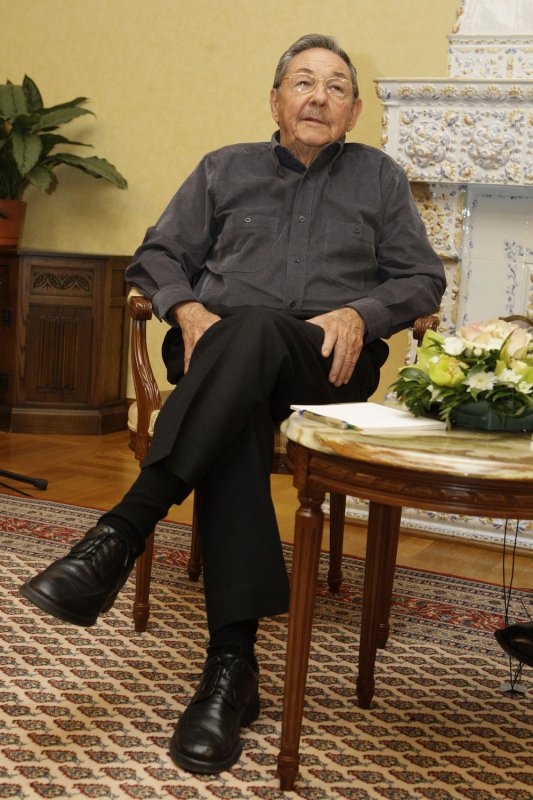1 of 5 | Cuban leader Raul Castro sits during a meeting with Russian President Dmitry Medvedev in the official residence Zavidovo, 75 miles northwest of Moscow, on January 29, 2009. Medvedev hosted Castro during his first visit to Russia in more than two decades. (UPI Photo/Anatoli Zhdanov) |
License Photo
WASHINGTON, April 8 (UPI) -- Is President Barack Obama preparing to end 50 years of U.S. embargo against communist Cuba? It's certainly looking like it.
Jeffrey Davidow, Obama's chief adviser for the upcoming Summit of the Americas, to be held April 17-19 in Trinidad and Tobago, made clear this week that the president plans to ease travel restrictions to Cuba for U.S. citizens that had been tightened by the previous Bush administration. Before the summit opens, Obama is expected to announce the removal of limits on the amount of remittances that Americans with relatives in Cuba can send back to the island and to end restrictions on the number of times people from the United States can visit the island.
Obama's calibrated messages to Havana have already provoked a positive reaction. Ailing 82-year-old Fidel Castro, the communist dictator of the island for almost half a century, asked three visiting members of the Congressional Black Caucus, "How can we help President Obama?"
Castro met with U.S. Reps. Barbara Lee, D-Calif., Bobby L. Rush, D-Ill., and Emanuel Cleaver II, D-Mo. It was his first face-to-face meeting with any U.S. officials in the nearly three years since he had emergency intestinal surgery in July 2006.
The visit reflected changing attitudes toward Cuba on Capitol Hill. The visiting Congressional Black Caucus delegation also met with Castro's brother Raul, who is the island's ruler. And last month a bipartisan group of senators including Sen. Richard Lugar of Indiana, the elder statesman on foreign policy issues among Senate Republicans, called for an end to the economic embargo on Cuba.
The once-strong anti-Castro feelings in Congress are easing, at least among Democrats. Younger members affiliated with the Cuban-American community are looking for a more open relationship with Havana, while the members who have ties to older Cubans want the embargo, started 47 years ago, retained. At least one Congressional Black Caucus member used the Cuban term of "blockade" to refer to the embargo.
For nearly half a century, maintaining the embargo against Cuba has been a third-rail issue in U.S. foreign policy: Democrats have been as eager to enforce it as Republicans. It was, after all, John F. Kennedy, the most revered Democratic president since Franklin Roosevelt, who risked thermonuclear war to force the Soviet Union to pull its lethal intermediate-range nuclear missiles out of Cuba in the 1962 missile crisis. And it was never forgotten that Castro at that time was far more willing to risk a nuclear World War III than Soviet Premier Nikita Khrushchev was.
However, Castro, while still alive, is now a frail and fading figure. More than 1.5 million Cuban-Americans currently have relatives back on their native island. And for Cuba, as for North Korea, being cut off from most of the world has only succeeded in keeping its old-fashioned repressive communist regime in power.
Castro failed miserably in his efforts to export romantic, communist revolution and chaos throughout the Western Hemisphere. By contrast, today President Hugo Chavez of Venezuela packs far more economic, diplomatic and sheer political power than Castro ever did.
From the narco-guerrillas of the Revolutionary Armed Forces of Colombia to a friendly government in Bolivia, Chavez has been energetically spreading his influence across the northern "crescent of crisis" in South America, backed by both Russia and China.
Last year the Kremlin flew two of its front-line Tupolev Tu-160 Blackjack supersonic bombers armed with nuclear-capable, standoff air-launched cruise missiles to Latin America. But it was Venezuela that hosted them, not Cuba. The Castro brothers had become an almost-forgotten backwater even to Russia, the nation that backed and protected them for so long.
The outreach to Cuba could yet backfire on Obama. Raul Castro remains, like his brother, an unreconstructed communist revolutionary who regards the United States as the source of all evil in the world. However, if the outreach program succeeds, it may serve to dramatically reduce the Republican Party's already eroding historic lock on Cuban-American support, especially in the crucial state of Florida, the fourth most populous state in the United States, which is therefore of huge importance in the Electoral College.
Longtime opponents of Castro are certain to oppose Obama's moves toward ending the embargo, but they were his implacable opponents anyway. After 47 years, it looks like the embargo's day is done.















